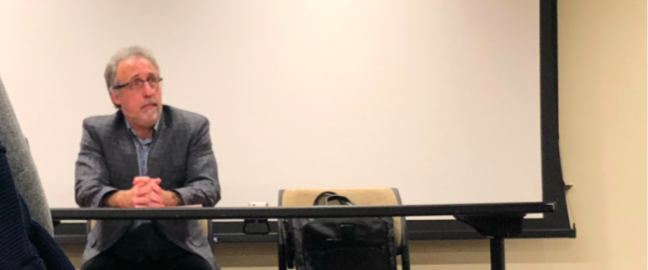Wisconsin Union Directorate Society and Politics hosted University of Wisconsin political science professor Howard Schweber to talk about free speech and academic freedom on college campuses across the country.
Freedom of speech and academic freedom are not only not the same thing, Schweber said, but they are actually opposing concepts. Freedom of speech is related to government control, whereas academic freedom is the ability for a university or a similar institution to pursue whatever intellectual paths of thought they wished, he said.
In an example, he referenced how UW would not be compelled by the government to hire a flat Earth theorist for their science department, as it would not be conducive to the university’s beliefs. This would be an exercise in academic freedom, standing in opposition to free speech by not giving the potential professor a platform.
Schweber further explained that structured settings actually require rules to limit freedom of speech.
“There are lots of times where it is entirely appropriate for the government to say ‘you cannot talk about certain topics,’” Schweber said. “For example, if the city council has a meeting to discuss road plans and you want to get up and explain how disappointed you are in the Atlanta Falcons defense this year, you will not be allowed to do that. It is just not relevant to the reason for holding the gathering.”
UW defines acceptable, unacceptable protest in recently updated guidelines
Freedom of speech on campuses has been brought up after UW has seen restrictions and guidelines to student protesting.
While a student has the right to protest a speaker, a student never has the right to disrupt a speaker, Schweber said. It is “the obligation of the university” to stop a student from disrupting a speaker.
Schweber also shared his insight into the decision by the UW Board of Regents which set a precedent for what type of protest was allowed and the proper disciplinary actions. He said what prompted the decision was the concern that the government, in this case, UW, was not fulfilling its obligation to protect speakers.
“Is it appropriate to protest a speaker? Of course, it is … On the sidewalk, not in the classroom,” Schweber said.
Not to be left out, however, was Schweber’s qualms with the Board of Regents’ decision.
He said the Regents should not have used the word “disrupt,” as it was too vague of a term. He expressed concerns that people may feel their freedom of speech is limited because they fear being punished due to the vagueness of the term.
New campus free speech policy draws mixed responses from UW students, staff members at panel
Additionally, Schweber said mandating disciplinary action leads to not seeing any disciplinary action at all.
“The more likely outcome is that the rules will not be applied at all, and the opposite of what is intended will be achieved,” Schweber said. “No student will ever be disciplined for disrupting speech. Why would you if it is a mandatory and Draconian penalty and you as an administrator can avoid that by simply not filing charges at all?”













